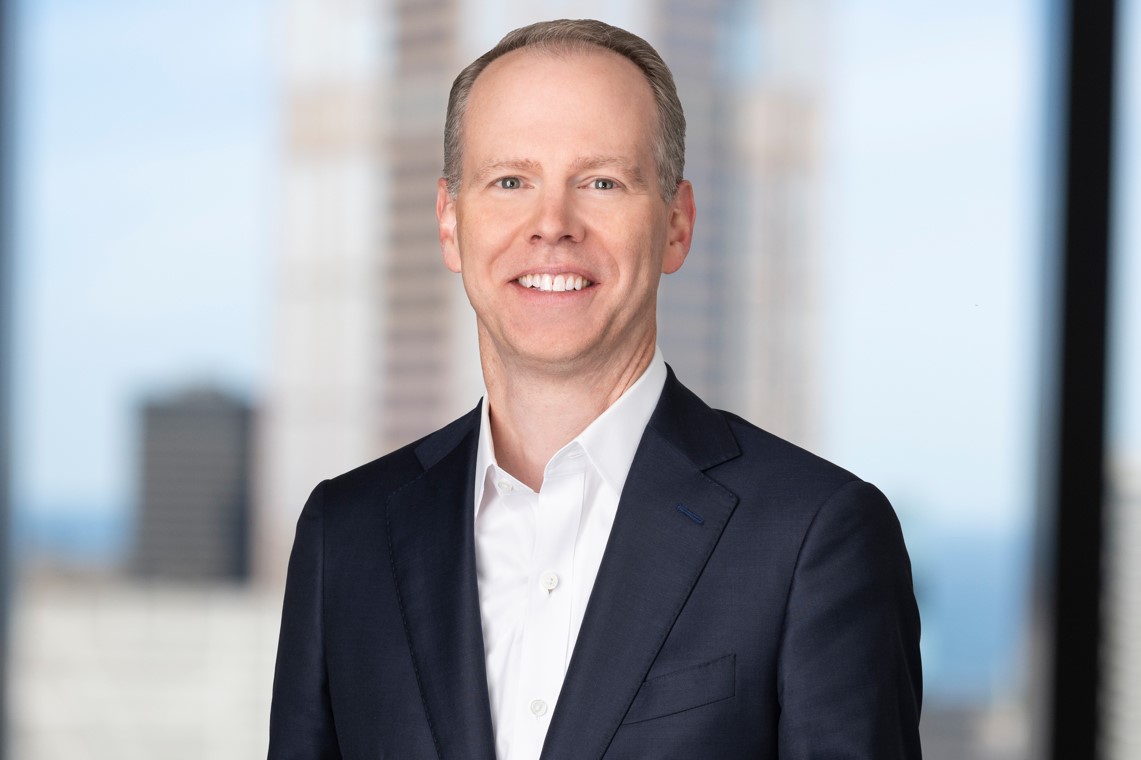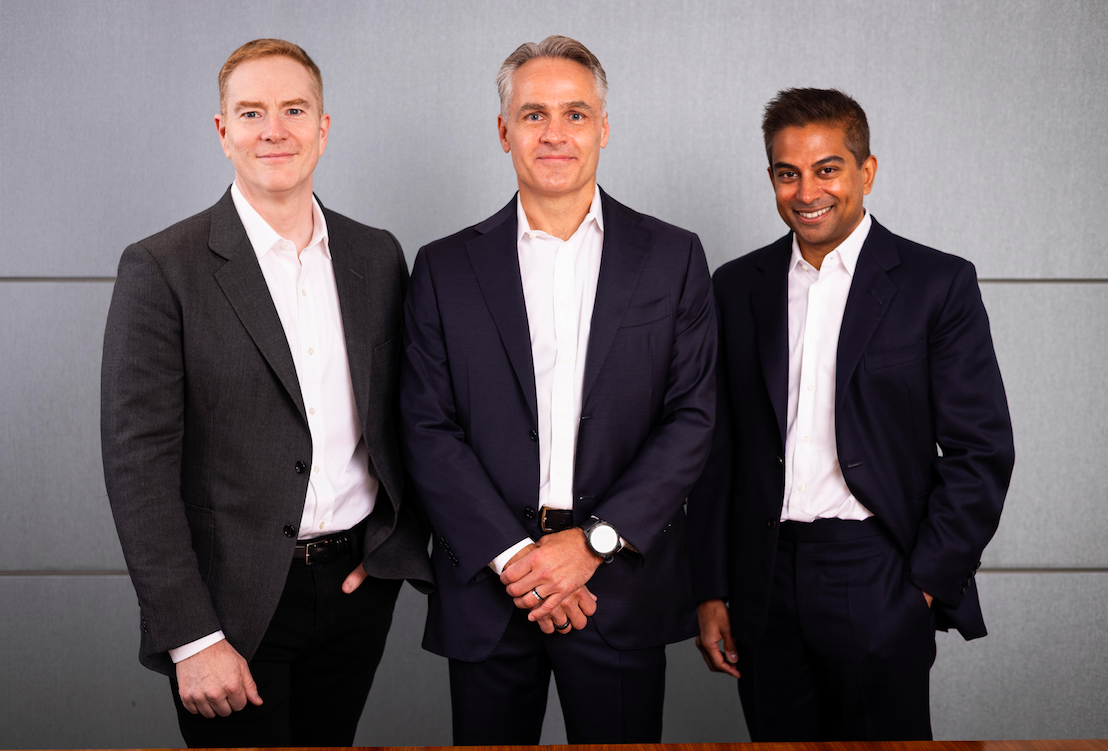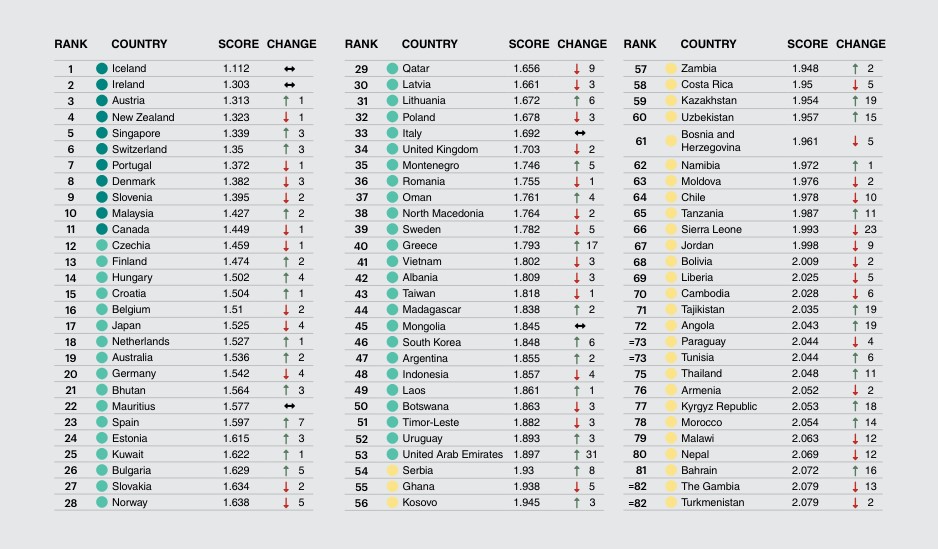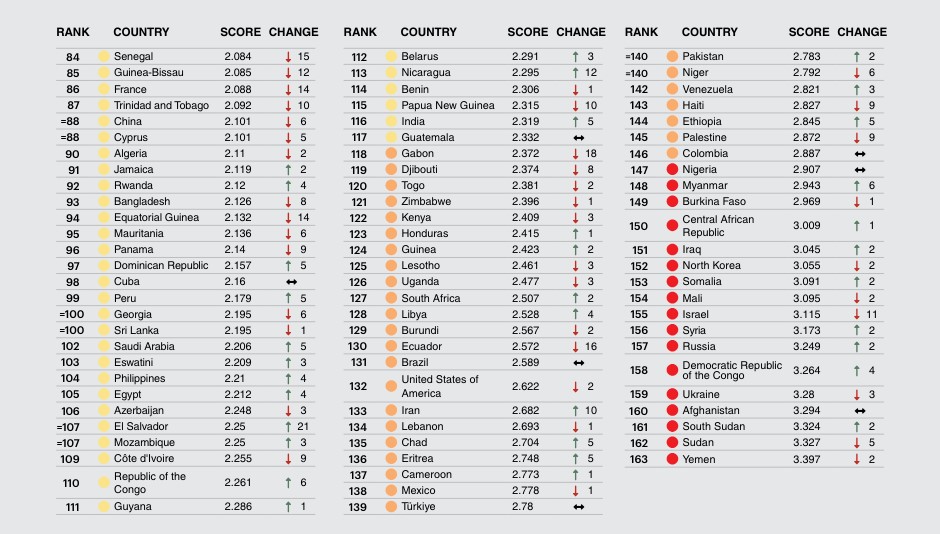
Investors’ current concerns about geopolitics and political instability are entirely justified. According to the latest edition of the Global Peace Index (GPI), a study measuring relative peace worldwide by the international think tank Institute for Economics & Peace (IEP), the current state of peace is the most fragile since World War II.
The report shows that without joint and coordinated efforts, there is a risk of escalating existing conflicts and provoking new ones. Its main conclusion is that up to 97 countries have seen a decline in their levels of peace compared to last year’s edition, more than any other year since the creation of the Global Peace Index in 2008. Conflicts in Gaza and Ukraine were the main drivers of the decline in global peace, with conflict deaths reaching 162,000 in 2023.
Currently, 92 countries are involved in conflicts beyond their borders, more than at any other time since the creation of the GPI. Additionally, the global economic impact of violence increased to 17.5 trillion euros in 2023, representing 13.5% of the world’s GDP.
Two other key findings from the report are that exposure to conflicts poses a significant risk to government and business supply chains and that the degree of militarization recorded the highest annual increase since the creation of the GPI, with 108 countries becoming increasingly militarized.
The report details that 95 million people are refugees or internally displaced due to violent conflicts, and 16 countries now host more than half a million refugees. On the flip side, Spain is now the twenty-third most peaceful country in the world, having climbed seven places since last year, while North America is the region that has experienced the greatest deterioration in its peace levels due to increased violent crime and fear of violence. In contrast, the first military scoring system, driven by IEP, suggests that the U.S. military capacity is three times larger than that of China.


A Less Peaceful World
According to the GPI 2024, the world is less peaceful for the twelfth time in the last 16 years and worsens its levels of peace for the fifth consecutive year. In this regard, 97 countries in the world have deteriorated their records. The report concludes that many of the conditions that precede major conflicts are higher than they have been since the end of World War II. Currently, according to the report, there are 56 active conflicts in the world, the highest number since World War II. Moreover, they increasingly have a greater international component, with up to 92 countries involved in conflicts outside their borders, the highest number since the creation of the Global Peace Index.
The growing number of minor conflicts increases the likelihood of more major conflicts occurring in the future. For example, in 2019, Ethiopia, Ukraine, and Gaza were identified as minor conflicts. Currently, according to the report, there are 16 countries where more than 5% of the population has been forced to flee.
The Victims
Last year, according to IEP, 162,000 conflict-related deaths were recorded, the second-highest number in the last 30 years. The conflicts in Ukraine, with 83,000 deaths, and Gaza, with estimates of at least 33,000 until April 2024, caused nearly three-quarters of the deaths. In the first four months of 2024, conflict-related deaths worldwide totaled 47,000. If this rate continues for the rest of the year, it would be the highest number of conflict deaths since the Rwandan genocide in 1994.
Additionally, by mid-2023, more than half of all refugees under UNHCR’s mandate came from only three countries: Syria, Afghanistan, and Ukraine. In this regard, Syria is the state with the highest magnitude of displacement, where the impact and aftermath of the Syrian civil war have caused 56.7% of the entire population to be internally displaced or refugees.
“During the last decade, peace levels have declined in nine out of ten years. We are witnessing a record number of conflicts, increased militarization, and greater international strategic competition. Conflicts negatively affect the global economy, and business risks stemming from conflicts have never been higher, exacerbating current global economic vulnerabilities. It is imperative that governments and businesses worldwide step up their efforts to resolve numerous minor conflicts before they become major crises. Eighty years have passed since the end of World War II, and current crises urgently require world leaders to commit to investing in resolving these conflicts,” explains Steve Killelea, founder and executive chairman of the IEP.
It is noteworthy that Europe remains the most peaceful region in the world in the GPI 2024, hosting seven of the top ten ranked countries. However, it recorded a 0.24% deterioration in peace compared to last year. Of the 36 countries in the region, 13 improved and 23 worsened their level of peace. The main cause of this decline was the deterioration in militarization and the conflict between Russia and Ukraine. Consequently, European countries have re-evaluated their military spending and overall combat readiness.
The Chronic Conflict Between Ukraine and Russia
Regional conflicts like the war between Russia and Ukraine, according to IEP, illustrate the devastating human cost and complexity of modern warfare. The latest figures suggest that last year there were more than 83,000 deaths from internal conflicts in Ukraine alone, meaning that more than half of all deaths in 2023 occurred in this single conflict.
According to the report, the war in Ukraine has caused nearly 6.5 million refugees by March 2024. In fact, the migration of young Ukrainians is significantly impacting the country’s ability to recruit new soldiers. It is estimated that nearly 30% of the population are refugees or internally displaced, a figure that rises to nearly 60% for young people of both sexes.
As a result of the war, Ukraine’s militarization continues to increase, with deteriorations recorded in the indicators of armed forces personnel, military spending (% of GDP), and nuclear weapons. Without a foreseeable immediate end to the war, Ukraine has become the fifth least peaceful country in the world, only surpassed by Yemen, Sudan, South Sudan, and Afghanistan.
On the other hand, Russia’s overall peace level deteriorated by 0.28% last year. It now ranks 157th in the GPI, making it the seventh least peaceful country in the world in 2024. According to the report, this conflict is an example of a “forever war,” where prolonged violence becomes seemingly endless, without clear resolutions, exacerbated by external military support, asymmetric warfare, and geopolitical rivalries. The conflict between Russia and Ukraine has led many European countries to re-evaluate their military spending and overall combat readiness, with 30 of the 39 European countries recording a deterioration in this area last year.
Tensions in the Middle East
The Gaza conflict has not only had a significant impact on the region but also on global peace. The conflict between Israel and Palestine escalated dramatically in 2023 following the terrorist attacks on October 7 and the subsequent military invasion of Gaza. Since then, more than 35,000 deaths and a severe humanitarian crisis have been recorded. The report details that Palestine experienced the fourth largest deterioration in peace in the GPI 2024, falling nine places to 145th. Israel, for its part, dropped to an all-time low of 155th place, the largest deterioration in peace in the GPI 2024. Ecuador, Gabon, and Haiti were the other countries with the greatest deterioration in peace.
The conflict has also had a significant impact on the media. According to this year’s edition of the Global Peace Index, media articles in Israeli media with negative sentiment towards Palestinians increased by 85% in early 2024, compared to 30% in 1999. Beyond the Israel-Palestine conflict, the Middle East region is in a delicate balance of forces. Syria, Iran, Lebanon, and Yemen are also in active conflicts, with increasing economic consequences and a high risk of open war. A further escalation of the conflict would have severe consequences for the global economy, potentially triggering a global recession. According to the report, Syria’s economy contracted by more than 85% following the start of the civil war in 2011, and Ukraine’s economy contracted by 29% in the year following the start of the conflict in 2022.
The Global Economic Impact of Violence
The report explains that the global economic impact of violence in 2023 was 17.5 trillion euros or 2,188 euros per person. This represents an increase of more than 145 billion euros compared to last year. This increase is largely driven by a 20% rise in GDP losses due to conflicts. Spending on peacebuilding and maintenance amounted to 45.602 billion euros, representing less than 0.6% of total military spending.
Violence and the fear of violence directly influence the economy, generating costs in the form of material damage, physical injuries, or psychological trauma. Fear of violence also alters economic behavior, primarily reducing the propensity to invest and consume. Spending on prevention, containment, and treatment of the consequences of violence diverts public and private resources from more productive activities towards protective measures.
Additionally, violence generates economic losses in the form of productivity deficits, foregone income, and spending distortions. The total economic impact of violence has three components representing the different ways violence affects economic activity: direct costs, indirect costs, and a multiplier effect.
Global Peace Levels
The report explains that Iceland remains the most peaceful country, a position it has held since 2008, followed by Ireland, Austria, New Zealand, and Singapore, which is in the top five for the first time. Yemen has replaced Afghanistan as the least peaceful country in the world. It is followed by Sudan, South Sudan, Afghanistan, and Ukraine.
The Middle East and North Africa (MENA) region remains the least peaceful. This
area is home to the two least peaceful countries in the world, Sudan and Yemen. Despite the tensions in this region, the United Arab Emirates recorded the greatest improvement in peace in the Middle East and MENA, climbing 31 places to 53rd position in 2024. Although most peace indicators have deteriorated over the past 18 years, there has been an improvement in the homicide rate, which decreased in 112 countries, while the perception of crime improved in 96 countries.











